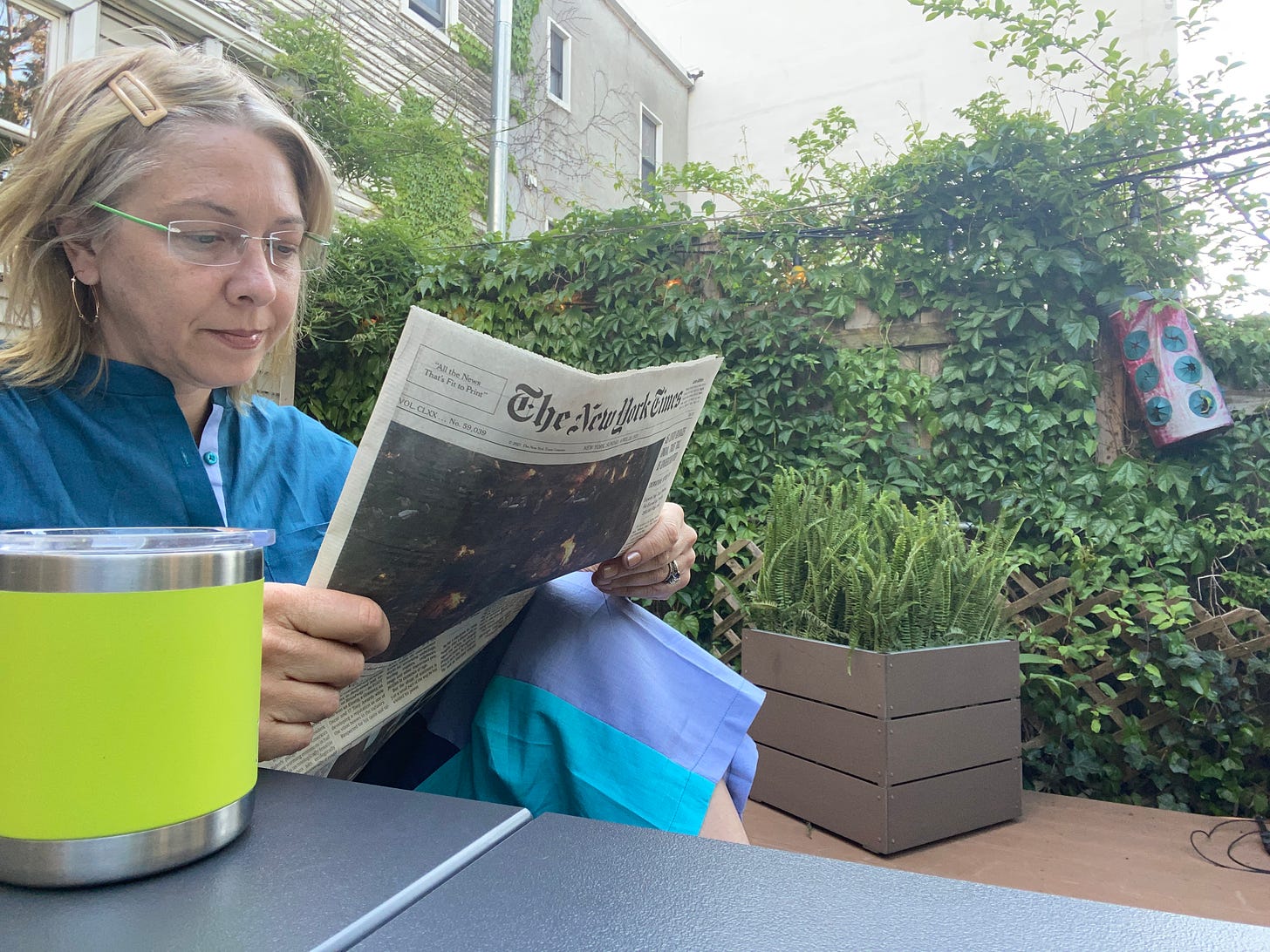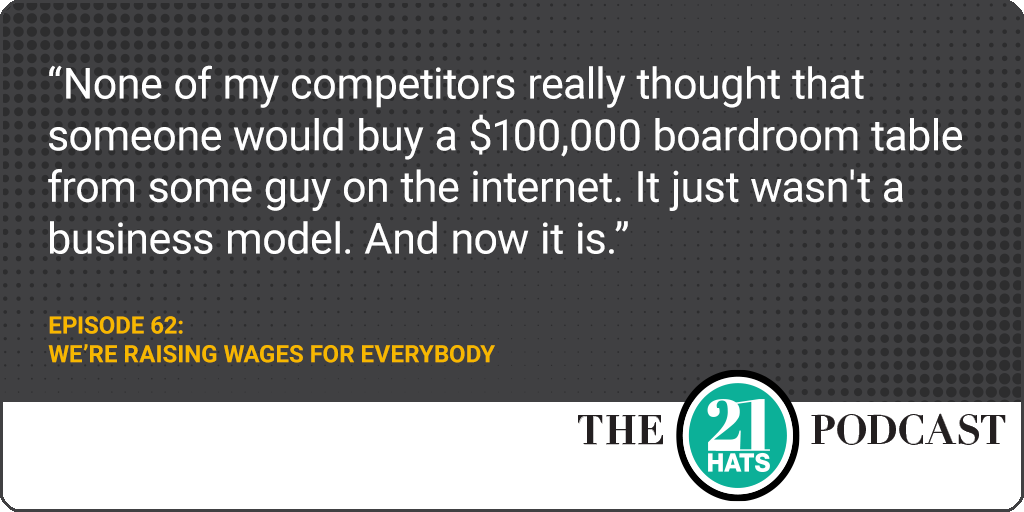One Owner’s Adventures in PR
Liz Reisch Picarazzi made a few mistakes before figuring out her DIY public relations strategy.
Good morning!
Today’s highlights: An EIDL extension loan update. A little-known benefit you can offer job candidates. And Carey Smith on how owners can hang on to equity.
GOVERNMENT SUPPORT
Here’s Ami Kassar’s EIDL extension update: “I receive a few emails a day with anxious borrowers asking for insight into what is happening in the EIDL extension program that allowed borrowers to request increases of their loan amounts up to $500,000. The short and long answer is: who knows? As far as I know, the furthest some borrowers have gotten in the process is an approval, with loan documents to sign. And then the waiting for funding begins.”
“I don’t know of any tricks or inside baseball to expedite the process. I suspect that somewhere inside the SBA engine, they are deciding how to prioritize these applications.”
“In the meantime, think about what you’re hoping to do with the money, should you get it. And it’s probably wise to explore a Plan B.” READ MORE
FINANCE
Not surprisingly, business owners borrowed more against their homes during the pandemic: “The figures, which measure balances and not originations, illustrate how business owners with existing loans on their personal homes dipped further into the risk of losing their homes in order to keep their businesses afloat. ‘You can think of it as a precautionary move,’ said New York Fed Senior Vice President Wilbert van der Klaauw, who co-authored the report. The report, which used some data from credit reporting agency Equifax, added that small business owners were also more likely to participate in mortgage forbearance programs.”
“About 11 percent of small business owners were participating in mortgage forbearance in May 2020, compared to 7 percent of borrowers overall.”
“Since February 2020, 17 percent of small business owners with personal mortgages participated in a forbearance program at some point.”
“In accommodation and food services, 23 percent of business owners entered forbearance on their mortgages at some point over the past year — the highest of any industry looked at by the New York Fed.” READ MORE
Carey Smith, who built and sold Big Ass Fans and now invests in startups, warns entrepreneurs not to give away equity too quickly: “In the past year, we talked with nearly 40 startups whose founders no longer have a controlling interest in their companies. More than half own 20 percent or less. Because of their inexperience, they'd sliced out equity as if it were imaginary cake at a child's pretend party. In their minds, equity may not have had any real value at that point. Naturally, the vulture ... er, venture capitalists always reached for a big piece. In return, these founders got more money than they'd ever seen in their lives, and many were inclined to squander it because they didn't have a real business plan.”
“Why do equity percentages appear as imaginary numbers to most founders? Because if a VC offers you $4 million for 40 percent of a business that isn't making money, that chunk of equity doesn't feel like a cost. It seems like you've lucked into a free lunch.”
“So, what do I advise rookie entrepreneurs? Easy: Before lunging for VC money, sit down with someone experienced and calculate exactly what your expenses should be over the next couple of years. You'll probably see that if you proceed with caution, you actually need much less money than you thought. (Whatever you do, don't start by leasing massive factories or buying real estate.)
“Bootstrap early on if you possibly can. My wife and I maxed out our credit cards and jumped on every zero-interest balance transfer offer. By paying your own way, you'll learn an amazing amount. Once you've proved your model and have a well-thought-out plan for growth, then consider seeking an investor, but vet them thoroughly.” READ MORE
PUBLIC RELATIONS
In her latest post, Liz Reisch Picarazzi walks us through the ups and downs of her attempts to get publicity for her business: “I once hired a publicist who got some nibbles from target publications but was never able to close the deal. Eventually, he reluctantly shared with me his back-and-forth emails with those publications, and to my dismay, I saw that his pitches were weak and definitely not worth the $5,000 a month I was paying him.”
“I made it easy for the writer by providing names and website addresses for my competitors.”
“I also knew they’d want client testimonials, so I lined up three clients who would be willing to be interviewed and photographed for the article.” READ MORE
MANAGEMENT
Jason Fried’s co-founder says everything is fine at Basecamp after the storm: “Since then, we've been regrouping, hiring new colleagues, and continued operating our services without a hitch. We have a great team in place, and everyone has been helping out wherever needed. We've also kept a watchful eye on the business. While there was a small uptick in cancelations for HEY during the first tumultuous week, they were more than offset by an increase in new customer signups for Basecamp. And now both products are growing like they were before that difficult week.”
“When you're in the midst of a storm like we were, it's easy to temporarily lose hope. To feel like it'll never pass. But it usually does, and so it did at Basecamp.” READ MORE
REOPENING
The lipstick index is up more than 80 percent: “Face masks and lockdown orders have kept lips largely out of sight in the pandemic. That, consequently, hurt lipstick sales last year. But makeup sellers say the fate of the cosmetics staple is starting to turn around as more people get vaccinated and the pace of social interactions picks up. According to the latest figures from market research firm IRI, which tracks point of sale data at retailers, lipstick sales hit $34.2 million in the four weeks ending April 18, up more than 80 percent from the same period a year earlier. They still fell short of pre-pandemic levels of over $40 million.”
“‘As places continue to open up and we go out, lipstick is like an instant gratification, a pick-me-up that we haven't had in the last 12 months and we miss it,’” READ MORE
California restaurants expect the recovery to take years: “With infections dwindling, vaccinations increasing and a positivity rate below 1 percent, officials say California is on track to lift most remaining restrictions on June 15. Yet many restaurants are struggling to serve the customers already allowed under current capacity limits because of a lack of staff, the committee said. Potential employees may be able to make ends meet with unemployment and federal stimulus benefits instead of going back to work, it said in its report. Some may fear for their safety during the pandemic, while others may want ‘more stable career paths’ after being repeatedly furloughed.”
“‘It’s not a given that we’re going to survive,’ said Laurie Thomas, executive director of the Golden Gate Restaurant Association and owner of two popular restaurants. ‘We’re all digging out from so much the past 15 months.’”
“With a lack of specifics from the state on the June 15 reopening, she fears restaurants will be allowed to return to full capacity only with vaccinated customers, leaving their staff to become ‘the new ID police’ expected to check vaccination cards — a role she and others said they can’t handle.” READ MORE
HUMAN RESOURCES
Gene Marks says employers are missing a big benefit they can offer job candidates: “Thanks to the March 2020 CARES Act, businesses have been given more incentives to help pay down their employees’ student loans. The provisions of the legislation — which were extended to 2025 in a subsequent stimulus bill — now allow employers to reimburse or pay down directly as much as $5,250 of their employees’ student loans every year.”
“And that amount will be non-taxable to the employee yet still deductible by the employer. This is an attractive — and affordable — benefit to offer, particularly during this tight labor market.”
“According to Scott Simmons, chief operating officer of Tuition.io, a platform that helps companies facilitate student loan repayments, employers have a growing appreciation of the financial burden that student loans represent for their employees and the demand for this benefit has been significantly increasing.”
“Simmons said that Tuition.io’s clients typically see anywhere from 20 percent to 40 percent lower rates of turnover in employee groups that participate in their student loan repayment benefit compared with employees who don’t participate.” READ MORE
With hiring tough, more companies are turning to automation: “The United States today is producing roughly the same amount of goods and services as before the coronavirus pandemic — but with 8.2 million fewer workers, equal to the combined payrolls of every employer in Virginia, Arizona and Iowa. Greater productivity is the rare silver lining to emerge from the crucible of covid-19. The health crisis forced executives to innovate, often by accelerating the introduction of industrial robots, advanced software and artificial intelligence that reduced their dependence on workers who might get sick. Even as millions of Americans remain jobless, retailers, food processors, energy producers, manufacturers and railroads all are stepping up their use of machines.”
“In Columbus, Ohio, Huntington Bancshares is fielding inquiries from dozens of business customers about financing for equipment purchases, chief executive Stephen Steinour told investors on a recent conference call.”
“It isn’t that automation is taking jobs from people; it’s allowing companies that can’t find enough workers to fill orders they otherwise would have to turn down.”
“‘You don’t fire workers and hire a robot. That happens exactly no times,’ said David Autor, an economics professor at the Massachusetts Institute of Technology.” READ MORE
READER FEEDBACK
Janice Barrow, a consultant, responded to the story we highlighted yesterday about entrepreneurs with burnout: "We understand the stress of being overworked and encourage all to take a break before getting to that point. It is not okay to feel burnt out. It is a sign of poor time management and poor work life-balance. Also it takes an immense toll on the mind, body and spirit. There must be a better way than striving for more. Is it worth it? What is enough?" READ MORE
THE 21 HATS PODCAST
Episode 62: We’re Raising Wages for Everybody: This week, Paul Downs, Jay Goltz, and Dana White talk about confronting inflation, raising their prices, what businesses owe their employees, and the venture-backed competitor who’s opening a store in Jay’s backyard. Among the questions they discuss: Would you take back a rebound employee? Are unemployment payments the main reason owners are struggling to fill jobs? Is there anything wrong with taking business from another business? How many companies are truly disruptive? And do owners take all of the risk? Or are there risks for employees, too?
You can subscribe to The 21 Hats Podcast wherever you get podcasts.
If you see a story that business owners should know about, hit reply and send me the link. If you got something out of this email, you can click the heart symbol, you can click the comment icon below, and you can share it with a friend. Thanks for reading, everyone. — Loren





